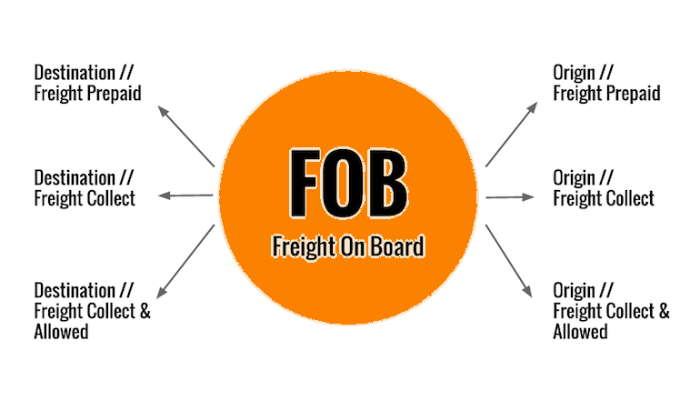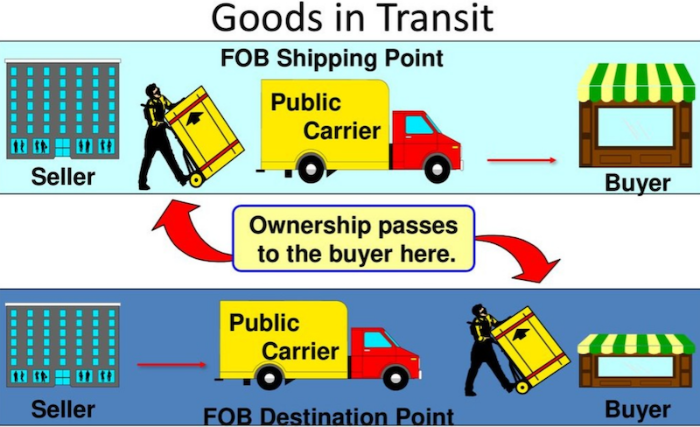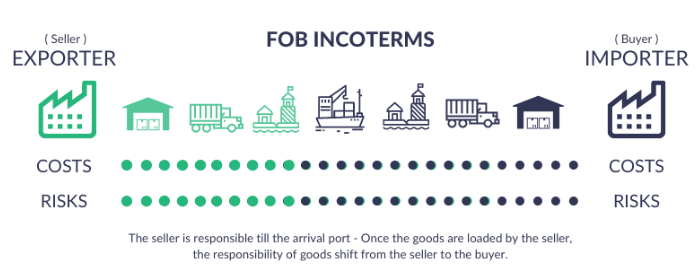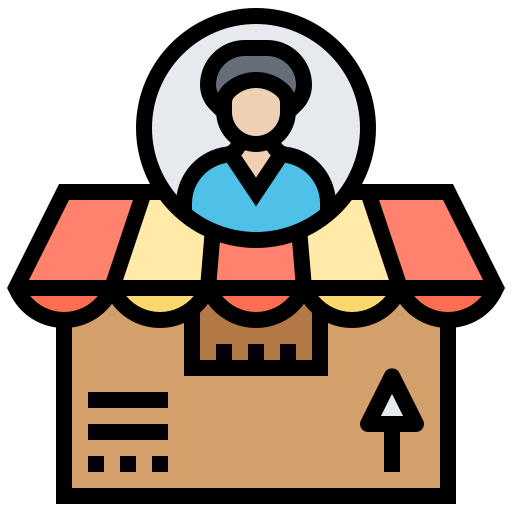People usually recommend choosing FOB on your first international purchase. But before you decide on choosing FOB, you should know what it is first, and how it compares to your other shipment choices.
Being a freight forwarding company for more than a decade, we’re experts in utilizing the different trade terms to deliver to various types of buyers. So, we want to share our expertise in FOB and help you decide whether or not it is the proper term of freight importation for you.
Read along to know what FOB is, its pros and cons, and why it matters!

What is FOB?
FOB is an international trade term meaning Freight on Board or Free on Board. It indicates the transfer of responsibility from the supplier to the buyer of shipped goods. The seller handles the costs involved in bringing the product to the ship’s rail. And the buyer pays for the shipping costs and freight charges until the arrival port.
Why does FOB matter?
FOB is essential because it states who becomes responsible for most certain expenses. The seller is responsible for bringing the product to the FOB shipping point. And the buyer assumes responsibility after the goods arrive at the seller’s shipping dock. If damages occur during the freight transport, it’s clear who’s responsible for paying the insurance costs and other costs associated.
In FOB, if a full container load becomes damaged during onboard freight, that becomes the buyer’s liability, not the seller’s. Explore other trade terms if FOB does not suit you. I discuss with my supplier before choosing accurate trade terms that benefit us.

What are the Buyers and Sellers’ Responsibilities with FOB?
In FOB incoterm, the two parties involved divide the responsibilities. The seller of the goods assumes the FOB price until the ship’s rail serves. The buyer takes responsibility after a named port and bears the cost of goods transported from one country to their own. Me and My supplier I both fulfill our responsibilities and act on our chosen terms.
Here are the basic rundowns of the responsibilities of both the buyer and the seller in FOB.
Seller’s Responsibility:
- Packaging: The seller’s responsibility is to package the cargo safely in international transactions. They’re also responsible for doing a pre-shipment inspection.
- Loading charges: The seller pays for loading charges at their warehouse.
- Deliver goods to port: The supplier pays for the transport to the shipping port once buyers purchase goods.
- Export licenses, taxes, and customs: The seller shoulders the costs of these documents before delivery.
- Loading on sailing ships: The seller also pays to pack the goods on the shipping vessel, although their customer pays for the freight service.
Buyer’s Responsibility:
- The buyer pays for the freight charges from the fob destination, also known as freight collection.
- Domestic shipping charges: The seller is no longer responsible for the cost of domestic shipping charges in the buyer’s country.
- Import clearance: While the seller is responsible for exportation, the buyer bears responsibility for modern domestic shipping costs.
- Insurance costs: Buyers are responsible for their goods once they board the shipping vessel. Anything that happens from the FOB origin will be the buyer’s responsibility.
- Payment for goods: The buyer pays for the value of the products in the container traffic.

Pros and Cons of FOB
Not sure if you should choose free onboard FOB among the shipping terms? Here are the advantages and disadvantages of FOB, so we can help you decide.
Advantages:
- Seller handles local export documentation in the fob origin.
It’s usually hard to handle export documents in an unfamiliar country. In FOB terms, the seller does this for you. You only need to think about the documentation required at the final destination of the shipping vessel or your country. It frees me from the documentation tension and stress as it is my sellers’ responsibility.
- You get control over your transport costs after the ship’s rail.
From the FOB origin, you can choose your fob shipping. The freight costs and control after the fob port are outside the seller’s premises. So, as a buyer, you can choose what you want. I prefer to go with Sea freight as it is an economical option.
Disadvantages:
- Higher product costs.
In FOB, the seller can sell their products at a higher unit price. In every unit, the seller includes the costs of processing documents and transport at their end.
- Higher local transport costs.
Most of the time, a buyer won’t visit the fob origin personally in international trade. So, as a buyer, you won’t be able to tell if a seller charged you more for the local transport costs. To avoid these Hidden costs, I get quotes from many shipping agents. It gives me idea about the average costs that the seller should charge.
Looking for the Best China Sourcing Agent?
Leeline Sourcing helps you find factories, get competitive prices, follow up production, ensure quality and deliver products to the door.
FOB vs. CIF vs. FCA
We all use these terms in our international trade. Yet the best practice is to consult with the supplier and on which thing he agrees. Remember you are bound to fulfill your part after the agreement. Here are the definitions of these three different shipping terms:
FOB
As mentioned, FOB stands for Free on Board. FOB incoterms mean that a transfer occurs in the responsibility for costs in the middle of transport. The transfer happens after the supplier loads the cargo at the shipping point.
CIF stands for Cost, Insurance, and Freight. Compared to FOB incoterms, in CIF, the buyer pays less as the supplier’s shoulders the freight costs after the shipping point. The supplier also pays for the cost of insurance. CIF is a form of freight prepaid.
Suggested reading: CIF incoterms
FCA means Free carrier. The supplier, in this case, delivers the goods to a destination specified by the buyer. Unlike free-on-board FOB, the supplier is not responsible for loading costs at the origin port.
Suggested reading: FCA incoterms
FOB Risks

- For suppliers: Buyers don’t apply for insurance.
One of the most significant risks in freight collection FOB for suppliers is when buyers don’t apply for insurance. When uninsured cargos are damaged during transport, the risks that insurance companies are supposed to handle fall on the exporter instead. Losses can be massive for suppliers in this situation. As a supplier, you first make sure your buyer applies for any insurance, even if it is not perfect.
- For buyers: Additional penalty for delays.
For inexperienced buyers, the complexity of international and domestic shipments could pose a problem. There are many ways to receive penalties and delays if you don’t know what you are doing in FOB. If you are a beginner, then consult with an experienced fellow or shipping agent. It would solve your confusion.
FOB Example
Assume that a buyer from the United States buys a full cargo from a Chinese supplier. They decide the FOB shipping point is in Shanghai port. In this example, the supplier is only responsible for the costs of bringing and loading the goods in the port of Shanghai. After the FOB shipping point, the risks and expenses related to the cargo become the buyer’s responsibility and not the seller’s anymore.
If the goods arrive damaged at the port of the United States, the seller cannot be held accountable. To avoid these damages better to have any insurance to cover your losses. It saved me one time from a huge loss.
FAQs about FOB
What is FOB pricing?
The FOB pricing, otherwise known as Free on Board price, is the market value of the goods at the seller’s shipping port. It includes the costs of transport from the seller’s warehouse to the port.
Who pays freight on FOB origin?
In FOB, the buyer pays for the freight costs. The seller’s responsibility for the condition and price associated with the goods ends at the FOB point.
How does FOB work?
In FOB, the supplier pays for the cost of bringing and loading the cargo to the FOB port. After that, the buyer takes on the responsibility of freight costs, insurance, and importation documents and payments.
Is FOB for ocean only?
The FOB is only for sea transport and inland waterway transport. It does not apply to land and flight transportation of goods.
What’s Next
In buying in international transactions, most recommend FOB to inexperienced buyers. But, to be a responsible buyer, you need to know how this transaction works in detail. Know the advantages and disadvantages of FOB and be wary of the risks that come along with it.
If you’re looking for an experienced company to help you transact your first FOB transactions, let us help. LEELINE SOURCING has experience handling bulk orders for our clients anywhere globally.
Contact us and let us assist you in having your goods delivered to your door safely.








